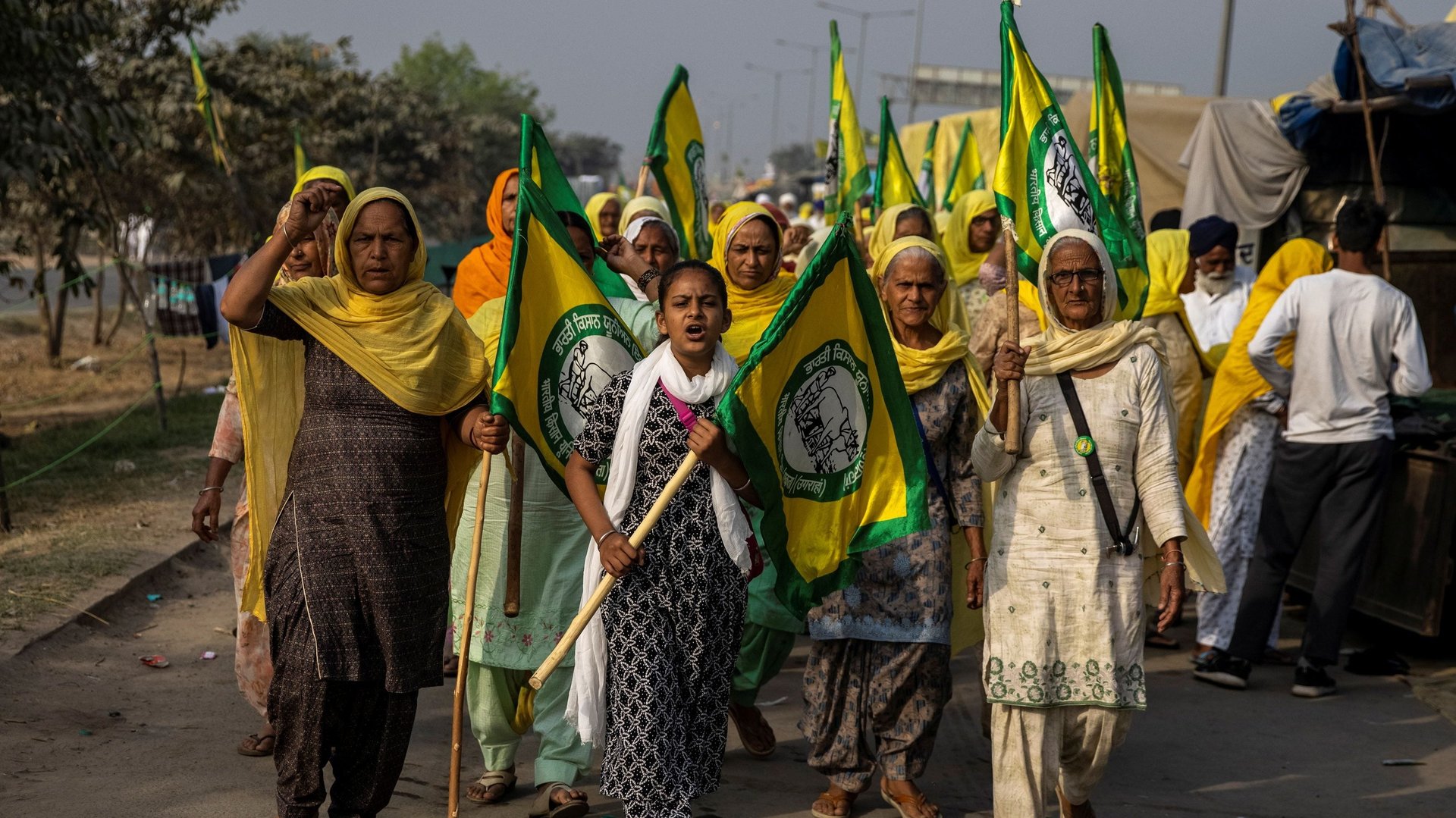Suez traffic, India farmers strike, octopus dreams
Good morning, Quartz readers!


Good morning, Quartz readers!
Here’s what you need to know
The Suez canal could take weeks to clear. The Ever Given container ship is still blocking the route, and holding up nearly $10 billion of goods every day.
Joe Biden faced questions about the migrant surge. The US president blamed the Trump administration for the problems at the southern border, and said that “it happens every single solitary year.”
India is restricting vaccine exports. It is a major global supplier of the AstraZeneca shot, but is also dealing with a new wave of infections.
A US House committee grilled tech CEOs. Twitter’s Jack Dorsey is leaving Facebook’s Mark Zuckerberg to fight Section 230 alone—it protects platforms from being sued over users’ posts.
China sanctioned nine UK citizens. In yet another retaliatory move, the group includes five members of Parliament.
Meanwhile, a British luxury brand is also in China’s crosshairs. Alongside Nike, H&M, and others, Burberry faces a backlash over the controversial cotton industry in Xinjiang.
What to watch for

India braces for a nationwide strike. After four months of farmers’ protests at the borders of the national capital, the organization leading the demonstrations has called for a shutdown from 6am to 6pm today, Niharika Sharma reports, appealing for all road and rail transport, markets, and other public places to remain closed across India.
Thousands of farmers have been protesting since November against the newly introduced farm law reforms, which they think will make them vulnerable and put them at the mercy of big corporations like Reliance Industries.
Charting the EU’s vaccine hesitancy
Europe’s vaccine program has been plagued by three different problems: low supply, ineffective on-the-ground distribution, and vaccine hesitancy among the population. A recent poll found that trust in the AstraZeneca vaccine, in particular, has taken a hit in Western Europe in recent weeks.

This is especially troubling given the EU is in the middle of the third wave of coronavirus cases. Annabelle Timsit explains what needs to be done to convince Europe that the AstraZeneca vaccine is safe.
How to launch a racial justice initiative at work
As Black workers in the US watched the killings of George Floyd and Breonna Taylor, and Asian workers witnessed the shooting in Atlanta that claimed the lives of six Asian women, many felt spurred to action.
You don’t have to wait for executive support to start a racial justice initiative at your organization—just follow Kya Muckle’s steps:
Define your mission: Give yourself a tight deadline so you don’t get stuck spinning your wheels, and ground your mission in a cause that aligns with your organization’s own mission.
What about executive support?: Do your research, come prepared to answer questions and ease concerns, and make the larger framework clear.
Give yourself some credibility: This project isn’t a typical project, so don’t treat it like one: third-party credibility makes the project “real,” not just another internal corporate initiative.
Get others involved: Don’t confine your efforts to your office’s usual suspects of antiracism-minded employees—start a dialogue with employees from all backgrounds.
Keep it going: Don’t lose momentum after a big win; keep your strategy flexible to new goals and projects.
✦ Looking to mobilize with coworkers to effect positive change at your workplace? Quartz’s field guide to building an antiracist workplace can get you moving in the right direction. If you’re not yet a member, try it out for free.
You asked about Covid-19’s origins
Why does it matter where Covid-19 came from?
“The more we can understand about how this [pandemic] happened, the better chance we have at stopping it from happening in the future,” says Rasmus Nielsen, a computational geneticist at the University of California, Berkeley.
But finding the virus’ origins could have massive geopolitical consequences.
A spillover from animals to humans would mean that the SARS-CoV-2 happened naturally, and that scientists would need to work with public health officials to develop adequate pandemic preparedness. A lab origin, meanwhile, could mean that some individual or group may be to blame, and that could result in an upheaval of the way scientists research potential pathogens in the future.
It could also damage China’s relationship with the rest of the world. Its government has been frustratingly opaque about information about the early days of the pandemic, and has failed to cooperate with global scientists’ efforts to get to an answer.
Katherine Ellen Foley has more on what we do and don’t know about Covid-19’s origins, and the real geopolitical and scientific consequences to finding the definitive answer.
Surprising discoveries
A worker got his final paycheck-in 90,000 coins. The $915 salary took up a ton of space.
Octopuses might dream like humans. But their dreams only last for about a minute during active sleep.
One step closer to permanent night? The US is on the verge of researching how to block out the sun to combat climate change.
The pandemic has not been good for the paparazzi. One agency cited homebound celebrities and a legal battle with Meghan Markle among the reasons for its bankruptcy.
Rabbits dug up a 9,000-year-old Stone Age tool. The discovery has to be the cutest archeological site ever.
Our best wishes for a productive day. Please send any news, comments, coal mine bids, and bunny archaeologists to [email protected]. Get the most out of Quartz by downloading our iOS app and becoming a member. Today’s Daily Brief was brought to you by Hasit Shah, Jane Li, Mary Hui, Jordan Lebeau, and Liz Webber.